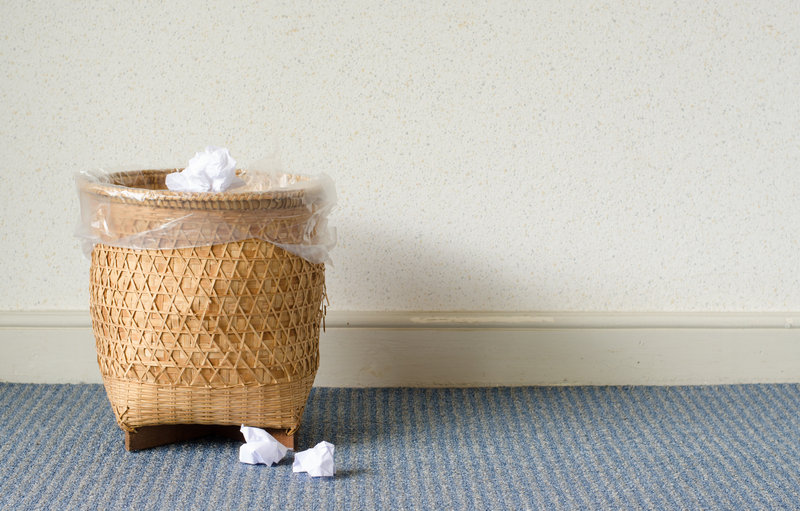Make Your Office Greener with Effective Recycling
Are you concerned about your office's environmental impact? If so, you're already one step closer to creating a more responsible and productive workplace. Going green isn't just a trend--it's a practical approach to operations that can make a huge difference. Implementing effective recycling in your office can help reduce your carbon footprint, boost employee morale, and even save money. In this detailed guide, we'll share how you can make your office greener with recycling, covering best practices, tips, and strategies for a more sustainable workspace.
Why Focus on Office Recycling?
Modern businesses generate a significant amount of waste, from paper and packaging to electronics and food. According to the EPA, over 21% of landfill waste is paper and cardboard, much of which comes from offices. Adopting sustainable recycling techniques helps not only the planet but also your company. Here's why effective office recycling should be at the top of your corporate agenda:
- Environmental Responsibility -- Show your commitment to eco-friendly practices and reduce landfill waste.
- Cost Savings -- Recycling programs can lower waste management expenses and encourage the efficient use of resources.
- Positive Brand Image -- Clients and employees value companies that prioritize sustainability.
- Compliance -- Many regions require businesses to meet certain recycling standards.
- Employee Engagement -- Sustainability efforts foster a sense of community and teamwork.

Steps to Create an Effective Office Recycling Program
1. Assess Current Waste & Recycling Habits
The first step to making your office greener through recycling is understanding your starting point. Conduct a waste audit to analyze what types and how much waste your office is producing. This process will highlight which materials are being wasted the most and reveal opportunities for improvement.
- Identify types of waste: paper, plastics, metals, e-waste, food scraps, etc.
- Measure the volume of each material over a week or month.
- Survey employees to gauge current recycling knowledge.
2. Set Clear, Achievable Recycling Goals
Effective recycling in the office requires direction. Set actionable targets for waste reduction. For example, aim to reduce landfill waste by 40% within a year, recycle 100% of office paper, or achieve a waste diversion rate of 75%. Having measurable objectives helps maintain momentum and gives your team benchmarks to celebrate.
3. Designate Recycling Areas & Label Bins Clearly
Visibility is key to a successful recycling program in the workplace. Place clearly labeled and color-coded bins throughout the office, especially in high-traffic areas:
- Paper recycling bins near printers and desks
- Plastic & cans bins in kitchen and break areas
- Electronics recycling drop-off points for old phones, batteries, and computers
- Composting bins for food waste (if your city offers composting)
Utilize signs that include images and written descriptions of what goes into each bin. This minimizes "wishcycling"--the act of tossing non-recyclables in recycling bins in hopes they're accepted--ensuring that only the correct items get recycled.
4. Educate and Involve Employees
Even the best recycling setup will fail without active participation. Schedule regular training or workshops to inform employees about:
- What materials can and can't be recycled
- The impact of proper recycling on the environment and the business
- How to prepare materials for recycling (e.g., rinsing containers, removing staples, breaking down boxes)
Encourage feedback and suggestions to make recycling easier. Consider appointing a Green Team--a group of eco-minded employees to champion the cause and motivate colleagues.
5. Partner with Recycling Providers
Many office buildings contract with waste management companies that offer sustainable recycling solutions for offices. Meet with your provider to:
- Clarify what materials they accept
- Request recycling reports or audits
- Arrange for secure disposal of sensitive documents and electronics
- Discuss composting options
You might also explore local charities for donating usable items (such as office furniture or lightly used electronics), further minimizing landfill contributions.
6. Monitor Progress & Celebrate Milestones
Keep track of your recycling successes by monitoring quantities of waste diverted from landfills and changes in waste management costs. Regularly share results with employees--recognizing departmental achievements or celebrating large milestones fosters enthusiasm and accountability.
Going Beyond Recycling: Reducing and Reusing in the Office
While focusing on effective recycling in your office is crucial, don't overlook the power of reduction and reuse. By tackling waste at the source, your office can become even more sustainable.
- Use digital files and cloud storage to minimize paper usage
- Purchase office supplies in bulk to reduce packaging waste
- Encourage reusable coffee mugs, water bottles, and utensils
- Choose refillable ink and toner cartridges
- Set printers to default double-sided printing
Every reduction measure supports your office's green goals, making recycling even more effective.
Top Tips for Effective Office Recycling
1. Keep Recycling Bins Accessible
Bins should be no more than a few steps away from where waste is generated. If employees need to hunt for them, they'll default to the trash can.
2. Communicate Clearly and Regularly
Internal newsletters, posters, and email reminders keep recycling top-of-mind for staff. Highlight environmental statistics and success stories to reinforce positive habits.
3. Lead by Example
Management should model good recycling behaviors and publicly support sustainability initiatives. Their example encourages buy-in at every level.
4. Host Special Green Events
Plan "Green Days" encouraging employees to bring in electronics for e-waste recycling, or host workshops for upcycling office supplies.
5. Provide Ongoing Recycling Training
New hires or changes to recycling rules merit refresher training. Ensure everyone feels empowered to recycle right.
Choosing the Right Recycling Solutions for Your Workplace
No two offices are the same. When crafting an effective workplace recycling program, consider these factors:
- Office Size: Larger teams may need more bins and frequent pickups.
- Type of Waste: A creative agency may prioritize paper recycling, while a tech company may focus on electronics.
- Location: Some areas offer more advanced recycling and composting than others.
- Employee Demographics: Is your team passionate about green issues? Tap into their interests when designing your program!
- Budget: Many sustainable changes save money in the long run--sharing this with stakeholders can help secure funding.
Green Office Certification and Recognition
Seeking external validation of your efforts? Several organizations offer green certification for offices that reward effective recycling and sustainability, such as:
- LEED Certification for Commercial Interiors
- Green Business Bureau (GBB)
- ISO 14001, Environmental Management Standards
- ENERGY STAR for buildings
These certifications spotlight your achievements and may open new opportunities with eco-conscious clients.
Common Challenges with Office Recycling & How to Overcome Them
Contamination of Recyclables
One of the biggest obstacles to efficient office recycling is contamination--when food, liquids, or wrong materials are mixed with recyclables. This can cause an entire bin to end up in the landfill.
- Promote "clean recycling"--rinse bottles and containers before tossing.
- Hang posters with clear instructions and photos.
- Regularly check bins for contamination and provide constructive feedback.
Lack of Engagement
Some employees may see recycling as inconvenient or unimportant.
- Involve staff in designing the program so it meets their needs.
- Offer incentives, such as eco-friendly prizes or recognition.
- Communicate how recycling benefits both the environment and the business.
Changing Recycling Requirements
Local regulations or recycling capabilities may change over time.
- Stay in touch with your waste management provider for updates.
- Adapt your internal communications and training promptly.

Office Recycling Success Stories
Many companies have transformed their sustainability practices by focusing on effective office recycling:
- Adobe: Over 95% waste diversion through dedicated recycling, composting, and employee education.
- Google: Food waste composting, plastic reduction, and robust e-waste recycling programs in their global offices.
- Salesforce: "Zero Waste to Landfill" certification at key campuses, combining creative reuse with recycling and composting.
These organizations show how dedicated recycling strategies make a meaningful difference.
Conclusion: Start Making Your Office Greener Today
Building a greener workplace doesn't require drastic measures--starting with effective office recycling lays a foundation for a more responsible and efficient business. From assessing current waste habits to celebrating your successes, each step contributes to a cycle of sustainability. Inspire your team, partner with the right providers, and strive to reduce, reuse, and recycle. Your office--and the planet--will thank you!
Ready to make your office greener with recycling? Take the first step today by sharing this article with your colleagues, scheduling a waste audit, or setting new green goals. The journey to a more eco-friendly office starts with one small, simple action.